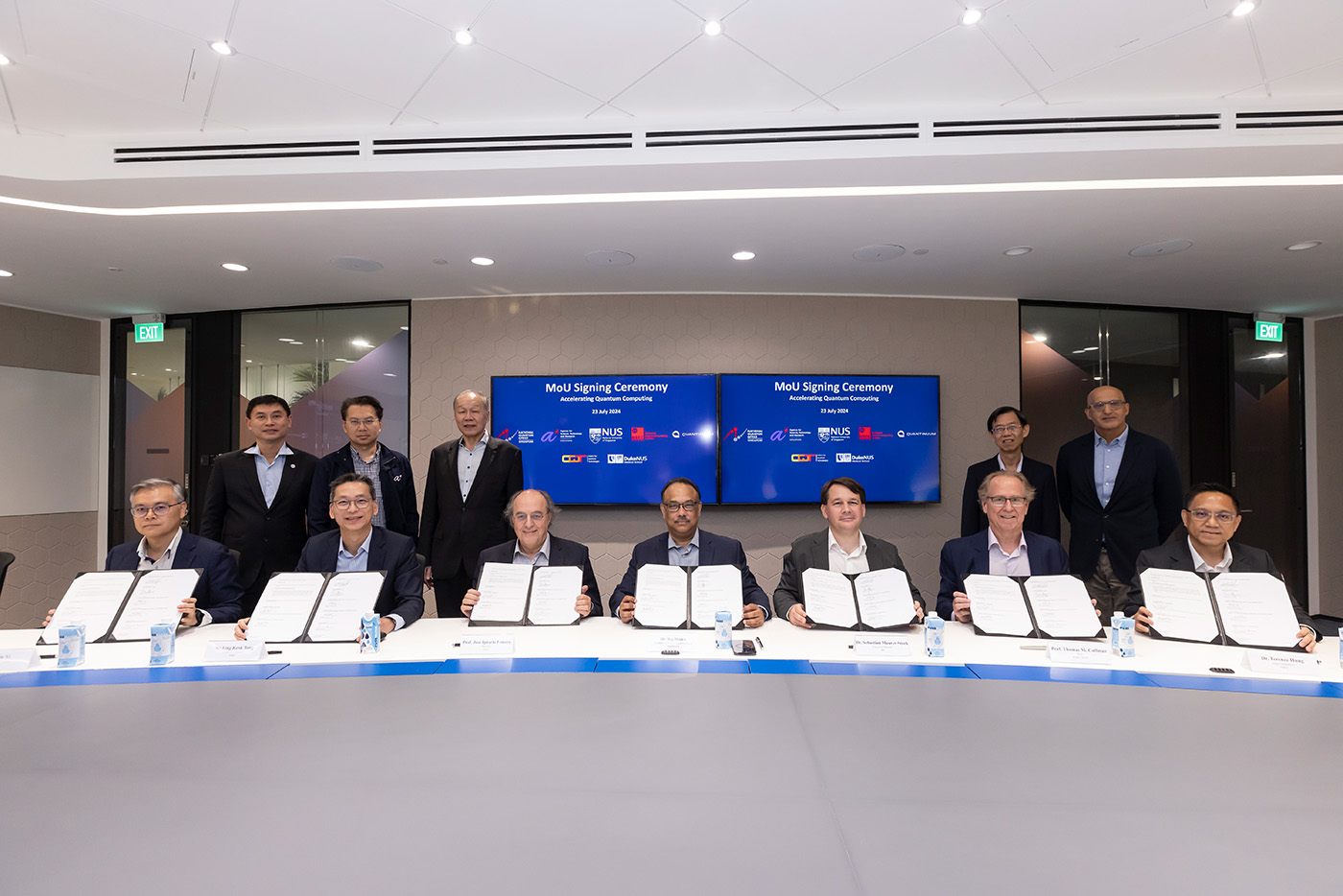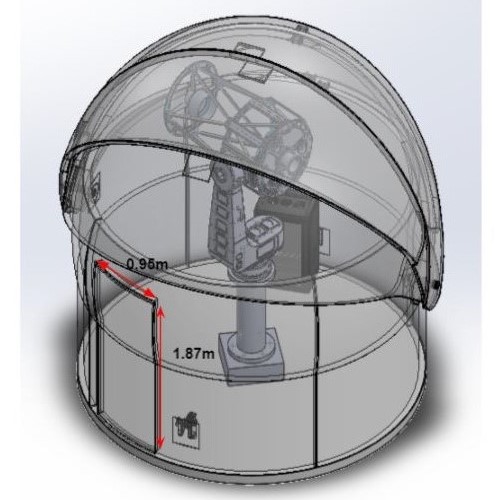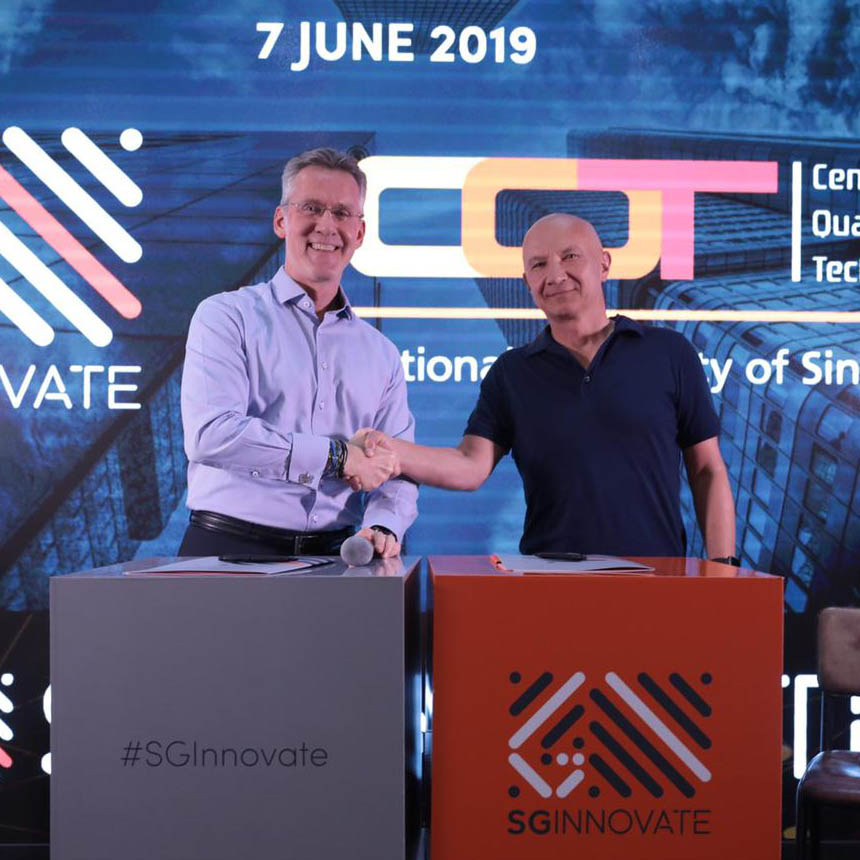Highlights
Singapore to collaborate with Quantinuum in quantum computing
 (From left to right, seated) The MoU signing was represented by Dr Su Yi, Executive Director, A*STAR’s Institute of High Performance Computing; Mr Ling Keok Tong, Executive Director, National Quantum Office; Prof José Ignacio Latorre, Director, Centre for Quantum Technologies; Dr Raj Hazra, President & CEO, Quantinuum, Dr Sebastian Maurer-Stroh, Executive Director, A*STAR’s Bioinformatics Institute; Prof Thomas M. Coffman, Dean, Duke-NUS Medical School; Dr Terence Hung, Chief Executive, National Supercomputing Centre Singapore. (From left to right, standing) The MoU signing was witnessed by Prof Tan Sze Wee, Assistant Chief Executive, Biomedical Research Council, A*STAR; Prof Yeo Yee Chia, Assistant Chief Executive, Innovation & Enterprise, A*STAR; Prof Low Teck Seng, Co-chair, National Quantum Steering Committee; Mr Quek Gim Pew, Co-chair, National Quantum Steering Committee; Mr Ilyas Khan, Founder & Chief Product Officer, Quantinuum
(From left to right, seated) The MoU signing was represented by Dr Su Yi, Executive Director, A*STAR’s Institute of High Performance Computing; Mr Ling Keok Tong, Executive Director, National Quantum Office; Prof José Ignacio Latorre, Director, Centre for Quantum Technologies; Dr Raj Hazra, President & CEO, Quantinuum, Dr Sebastian Maurer-Stroh, Executive Director, A*STAR’s Bioinformatics Institute; Prof Thomas M. Coffman, Dean, Duke-NUS Medical School; Dr Terence Hung, Chief Executive, National Supercomputing Centre Singapore. (From left to right, standing) The MoU signing was witnessed by Prof Tan Sze Wee, Assistant Chief Executive, Biomedical Research Council, A*STAR; Prof Yeo Yee Chia, Assistant Chief Executive, Innovation & Enterprise, A*STAR; Prof Low Teck Seng, Co-chair, National Quantum Steering Committee; Mr Quek Gim Pew, Co-chair, National Quantum Steering Committee; Mr Ilyas Khan, Founder & Chief Product Officer, Quantinuum
Singapore research organisations and Quantinuum signed a Memorandum of Understanding (MoU) on 23 July enabling access to Quantinuum’s advanced quantum computer, and to explore and collaborate on quantum computing use cases, focusing on computational biology.
The signatories from Singapore are the National Quantum Office (NQO), Agency for Science, Technology and Research (A*STAR), National University of Singapore (NUS) and National Supercomputing Centre (NSCC). NUS signed for the Centre for Quantum Technologies (CQT) and Duke-NUS Medical School to be part of the collaboration.
"I am excited to start this new collaboration between our scientific experts in Singapore and the multinational company Quantinuum. We bring know-how in quantum algorithms and computational biology to work with the Quantinuum team, which is building some of the highest performing quantum computers available in the world today," said CQT Director José Ignacio Latorre, who is also Professor at NUS and lead Principal Investigator for the National Quantum Computing Hub (NQCH).
Quantinuum offers an integrated, end-to-end quantum computing platform, leveraging trapped-ion technology. It is the largest quantum computing company that has demonstrated success in building the highest performing quantum computers.
To collaborate in computational biology, hybrid computing and talent development
Under the MoU, the parties agree to leverage Quantinuum’s H-Series and Helios quantum computers, to promote joint research and development (R&D) activities in various quantum computing applications. Helios is Quantinuum’s next generation quantum processor, to be introduced in 2025. Scientists from CQT, A*STAR’s Bioinformatics Institute and Duke-NUS' Centre for Computational Biology will be able to leverage Quantinuum’s machines to enhance capabilities in modelling complex biological systems, advancing drug discovery and personalised medicine. This builds on Singapore’s strong background in computational biology and the collection of quality health datasets.
“Right now, many promising biological discoveries stall when it comes to finding the right drug candidate that is not only effective at treating the disease but is also well-tolerated by patients. The process of finding the right molecule is slow and often limited in how many variables can be accounted for in a single model. Augmenting our existing capabilities with quantum computing could resolve these limitations, leading to better drugs for patients faster,” said Associate Professor Enrico Petretto, Director of the Centre for Computational Biology at Duke-NUS. “This partnership, which focuses on quantum applications in biology, will also benefit computational biologists-in-training seeking to deepen their understanding of how to incorporate quantum computing into their drug discovery work.”
The parties will also collaborate on developing hybrid computing solutions that include both classical and quantum computing infrastructures, leading to the creation of long-term strategic roadmaps. The MoU also enables collaborations in training and outreach through seminars, workshops and bespoke programmes to nurture quantum talent and contribute towards Singapore’s growing quantum community.
Plans for an R&D hub
In addition, Quantinuum plans to establish a dedicated R&D presence in Singapore, where researchers from both Quantinuum and Singapore could better exchange knowledge and expertise for further developments in quantum applications and algorithms.
NQCH, a national-level quantum programme and a joint initiative of CQT, A*STAR’s Institute of High Performance Computing (A*STAR’s IHPC) and the National Supercomputing Centre Singapore, will drive this collaboration with Quantinuum.
“This is a strategic collaboration with Quantinuum, following the launch of Singapore’s National Quantum Strategy in late May. Through the NQCH, the National Quantum Office has brought together key research performers to collaborate with Quantinuum on advancing R&D in quantum computing, which will give Singapore an edge in quantum use cases across various industries. Equally important, this MoU will give Singapore access to Quantinuum’s state-of-the-art H-Series and Helios quantum computers. The NQO will continue to foster mutually beneficial partnerships through our national-level quantum programmes, and we look forward to delivering outcomes that could benefit the research, innovation and enterprise (RIE) ecosystem together,” said Ling Keok Tong, Executive Director, NQO. NQO overseas the development and execution of the National Quantum Strategy.
"Our collaboration underscores our commitment to advancing global quantum computing. By harnessing our cutting-edge H-Series quantum computers and leading quantum application software stack, we aim to pioneer transformative use cases in computational biology and life sciences, catalysing innovation across industries. Establishing an R&D hub in Singapore enhances our dedication to fostering a vibrant quantum ecosystem, driving scientific excellence, and nurturing top quantum talent. Together, we aim to make significant strides in quantum technologies, supporting Singapore's ambition to lead in the rapidly evolving technological landscape," stated Dr. Rajeeb (Raj) Hazra, CEO of Quantinuum.









